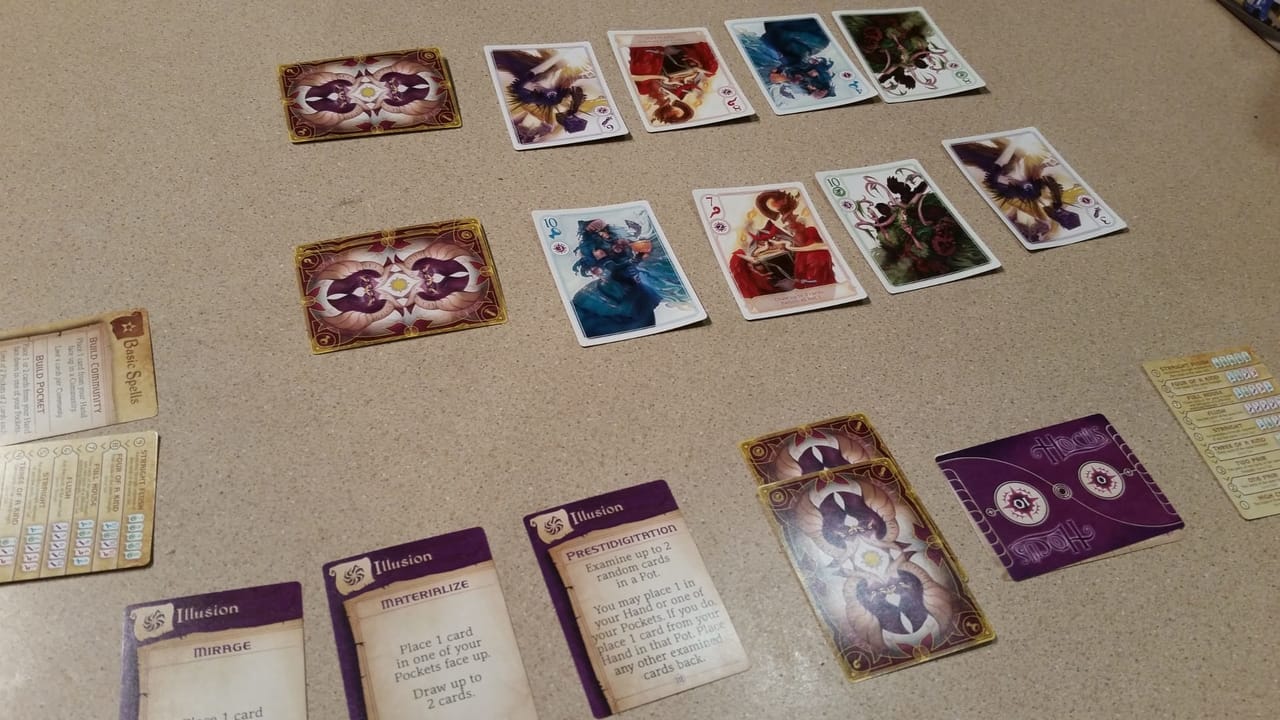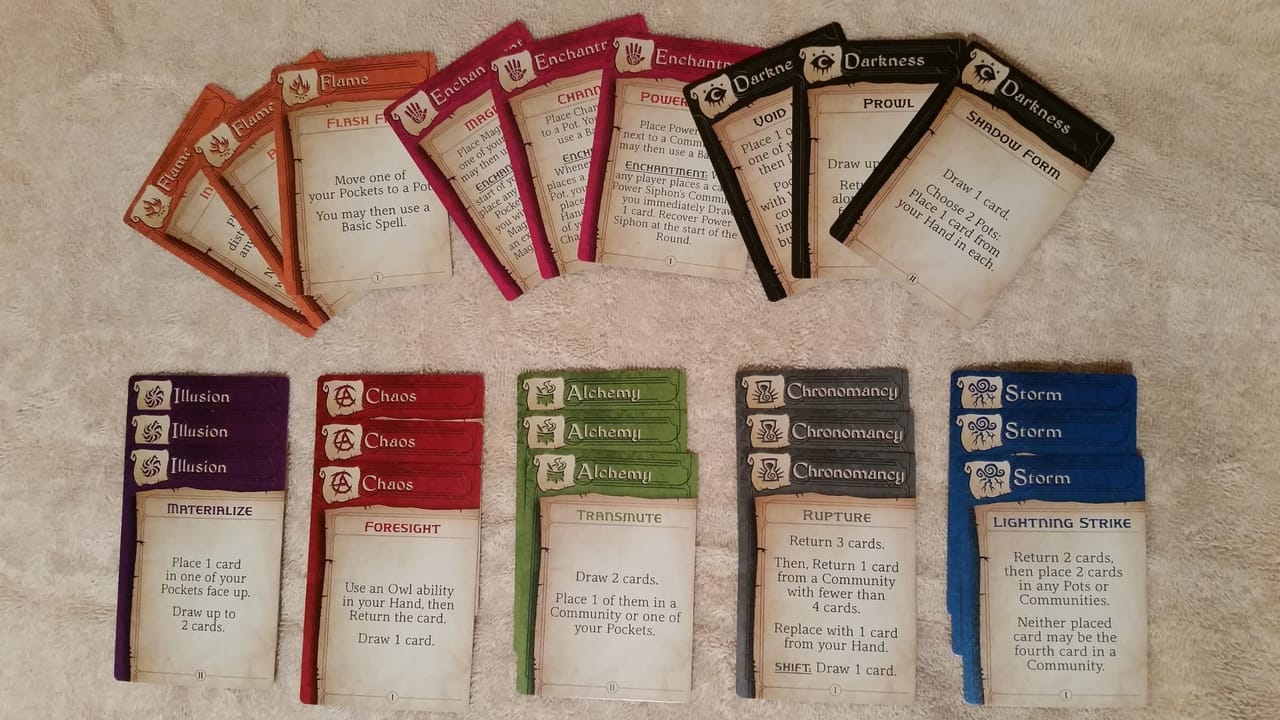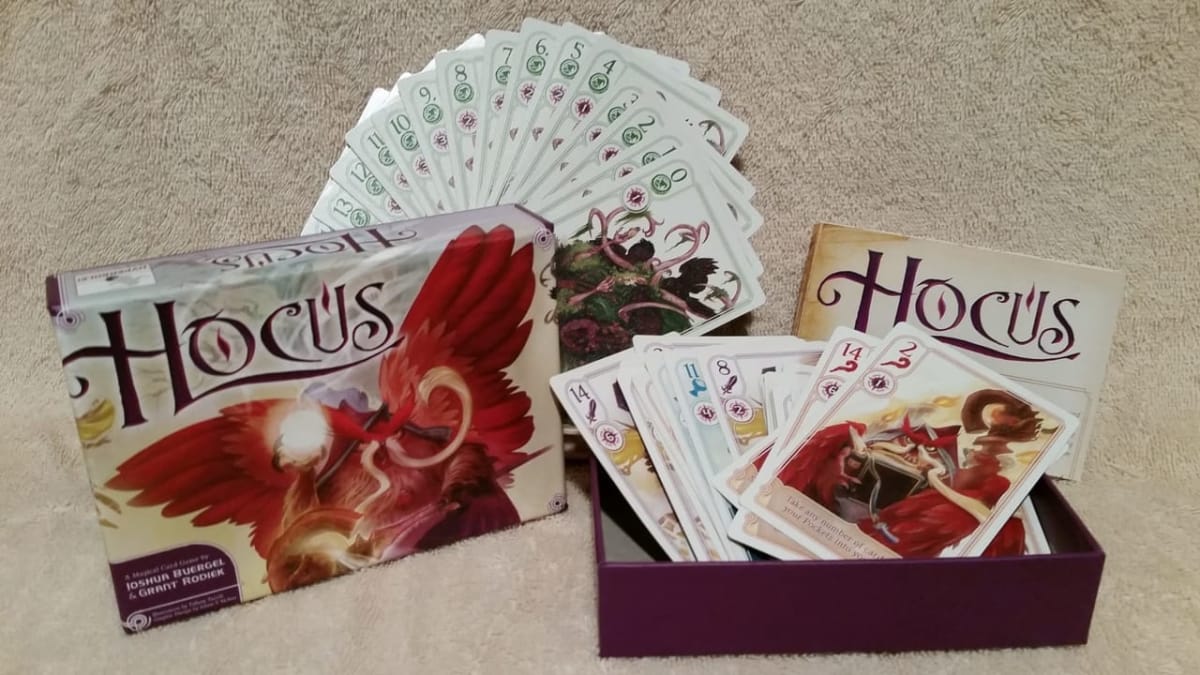I've always wanted to have a bit of a casual poker night with my friends, but none of them really seemed all that into Texas Hold'Em. Even though my tabletop group meets a few times a month, we're usually occupied with other games as it is. When I got Hocus (published by Hyperbole Games) in my hands, I was intrigued. The premise is that the game combines Texas Hold'Em style gameplay with magical themes and a few other rules on top.
Hocus has three "layers" of rules. The most simple and straightforward way to play the game is a modified version of the Texas Hold'Em rules set. There are no face cards in Hocus; rather, the cards are numbered from 0 to 14. (In games with less than five players, the 0 and 14 cards of the four suits are removed from play.) These are used to form "community" sets, "pockets", and "pots". Each regular card in Hocus has a second number denoting how many points the card is worth if it is placed in a pot. If you win a particular community, you claim that pot and add the points to your overall score.
Traditional Texas Hold'Em is a relatively straightforward game. Players are dealt a pair of cards to form their pocket. Three cards are placed down face up for all to see. A round of betting (or folding) takes place. A fourth card is placed down, another round of bets, and then the fifth and final card is placed down. One more round of bets are placed, and the player's hand is the best thing they can make out of the five table cards and the two in their pocket.
Hocus makes use of the same concepts in a different way. Games begin with players being dealt a hand of 9-10 cards (depending on how many people are playing the game). Each turn, a player may complete one of three actions. They can add a card to one of 2-3 communities which are used to form winning hands, they can add a card to a pot next to a community (which is how you earn points), or they can add 1-2 cards to their pocket (one for each community). After the last community is filled up, players get one more turn to make a final move. Communities are resolved one by one, and the winning hand takes all of the points in the associated pot. (In the rare case of a tie, the pot is split.) That's the basic version of Hocus, and by far it's the least interesting one compared to the additional rulesets.

One of the suits in the game has "owls", and this brings us to the second step up in terms of rules. The "Owls rule" states that any owls claimed as part of a pot may be held for the following round; the text on them can be resolved as a free action. Owls will typically have effects like "Draw a card", "Cast an additional spell" (that is, make an extra move), or "All players must contribute to a pot". Owls add a nice bit of randomness to the formula, and their effects can snatch victory away from an otherwise winning hand.
The place where Hocus really shines is the Advanced Spells. This is how I believe Hocus plays best. There are eight distinct "schools" of spells; each school has a theme of sorts that play different ways. Alchemy, for instance, allows you to build up cards with effects as straightforward as the "Draw 2 Cards" of the Transmute card. Advanced spells can also override the game's core rules - as an example, an Illusion spell allows you to place a card face-down in a community. Advanced Spells, as a general rule, will also let you override size limits for communities and pockets; I've had pockets with four cards in them (due to needing to change my intended hand) and communities with six cards - some of which were face down!
Within the eight schools of Advanced Spells are two higher-tier branches, Enchantment and Chronomancy. These are a bit more complex than the other six schools, and the rulebook recommends that you don't use these until you've got a good grasp of the game. Our last session with Hocus had at least one player using one of the two schools, and they definitely felt a good bit different from the other schools in terms of what they could do. Chronomancy, in particular, felt like it had a lot of potential to make huge game-changing moves that required an awful lot of build-up; unfortunately, none of us were able to really bring the big guns to bear in this respect.
The game fits neatly in a tiny box and has nothing in the way of moving parts. It's all cards; even the score tracking is done with a pair of cards that you slide over lines to keep track of your score. The simplicity of it is nice, and the box is compact as a result. Hocus can comfortably fit in a pocket or purse, and the game doesn't take up much more room than any other card game would in my experience. The cards themselves are of good quality and the box itself seems sturdy enough.

We picked up on the rules quickly enough, although there were certainly some conflicts. The publisher offers a supplementary FAQ on their website that expands on the things written in the rule book, and even with this resource we still had one or two areas where we had to make a call because the card text was worded ambiguously. It's understandable that something like this might happen within the limitations of printed rules, but conflicts in the rules ought to be made crystal clear in any expanded details published on a website. One issue was related to the "Rift" card in the Chronomancy school; it says that you can take a card from your Rift (a sort of side deck specific to this school), but it doesn't specify whether or not you can look through it or you have to draw it blind. (I made the call that players can look through it at will.) It's the biggest flaw that I've found about the game and one that can (and should) be easily corrected.
We played Hocus over the course of a few weeks totaling a dozen or so sessions. My group and I found it an enjoyable experience. Save for one or two quirks with the rules, it's easy enough to pick up. The flexibility in choosing which parts of the game are used and which are not can adjust the length and the complexity of the game making for a very convenient experience. This particular twist on a classic card game has a lot going for it.
The Bottom Line:
Hocus is a magical twist on Texas Hold'Em in a compact package. The rules can be adjusted from game to game making for a convenient experience that you can adjust to allow for different time or difficulty considerations.
Get This Game If:
- You enjoy Poker or similar games.
- You like compact games.
- You like to tweak rules to customize a game's difficulty and length.
- You're not a fan of randomness screwing up your best-laid plans.
- You dislike games where your strategy is heavily affected by other people.
- You dislike game rules that are flexible to the point of breaking.
- You, for some reason, have a deep mistrust of Owls and/or Wizards.
What do you think of Hocus? Are you fond of games that reinvent the classics? What other games that transform existing traditional tabletop games are you fond of? Let us know in the comments below!
Review Summary
Hocus is a magical twist on Texas Hold'Em in a compact package. The rules can be adjusted from game to game making for a convenient experience that you can adjust to allow for different time or difficulty considerations.
(Review Policy)Have a tip, or want to point out something we missed? Leave a Comment or e-mail us at tips@techraptor.net












